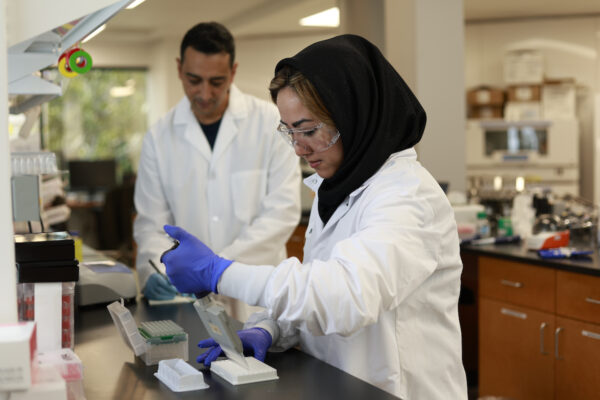
Arialys Therapeutics’ Amir Razai, principal scientist (l), and Roghiye Kazimi, senior research associate, perform complicated analysis of the company’s lead therapeutic candidate, ART5803.
When it comes to autoimmune diseases, some parts of the body are thought to be more protected from inflammatory responses than others. The brain is one such place, or at least it was. Scientific understanding of the central nervous system’s susceptibility to immune responses is evolving, and startup Arialys Therapeutics is building on that knowledge with a drug candidate for a rare brain disease characterized by inflammation. Depending on how the research progresses, the drug could also find applications in more prevalent neurological conditions.
The rare disease Arialys plans to treat first is anti-NMDA receptor encephalitis (ANRE). It’s a form of encephalitis caused by autoantibodies produced by B cells, a type of immune cell. La Jolla, California-based Arialys aims to treat ANRE with an antibody from Astellas Pharma. The startup is preparing for clinical trials that could start next year and it formally launched on Tuesday, backed by $58 million.

With the Rise of AI, What IP Disputes in Healthcare Are Likely to Emerge?
Munck Wilson Mandala Partner Greg Howison shared his perspective on some of the legal ramifications around AI, IP, connected devices and the data they generate, in response to emailed questions.
In ANRE, autoantibodies attack NMDA receptors in the brain that are key for forming and retrieving memories, perceiving reality, and activities such as breathing and swallowing. The disorder’s symptoms—problems with memory, speech, and cognition as well as seizures—are characteristic of other psychotic diseases. Consequently, ANRE is frequently misdiagnosed, as was the case with New York Post writer Susannah Cahalan. She documented her ANRE experience in the book “Brain on Fire: My Month of Madness.” The book was subsequently adapted into a movie.
One of the hallmarks of ANRE is the rapid onset of symptoms. It’s not unusual for a patient to go from normal to the intensive care unit in the span of two months, said Jay Lichter, president and CEO of Arialys and managing partner at Avalon BioVentures, the venture capital firm that incubated the startup. A definitive diagnosis comes from detecting the autoantibodies in a sample of cerebrospinal fluid.
The first line of ANRE treatment is the use of immunosuppressive drugs. While these therapies can work, a patient must take them for life. Such chronic immunosuppression raises the risk of infection. Second-line ANRE treatment is rituximab, an antibody drug better known for its use treating blood cancers by depleting B cells. But rituximab comes with serious complication risks of its own.
Arialys’s drug, ART5803, is an antibody fragment designed to bind to NMDA receptors and block pathogenic autoantibodies from doing the same. Lichter says ART5803 should be safer than a systemic treatment because it is highly specific to NMDA receptors found only in the brain, nowhere else in the body. In tests of the drug in monkeys, Arialys observed no safety signals. The company and its financial backers are also encouraged by signs of efficacy. Lichter said treatment led to monkeys returning to baseline levels. Those results were achieved quickly. While most CNS drugs take months to show an effect, Lichter said the Arialys drug produced a response within two weeks.
“What we think that speaks to is the robustness of this particular molecule,” he said.
ART5803 was discovered and initially developed by Astellas Pharma. Lichter said the Japanese pharmaceutical company reached out to Avalon, notifying the firm that it was looking to outlicense the molecule. Lichter had never even heard of ANRE, but someone familiar with the disease and the Astellas molecule was near Avalon’s La Jolla offices. Mitsuyuki “Mickey” Matsumoto, the former head of Astellas’s neuroscience research unit, was retired from the company and living in San Diego.
In speaking with Matsumoto, Lichter learned about ANRE and how an immunology approach could treat it. He also watched the “Brain on Fire” movie. The brain had previously been thought of as immune privileged, meaning it is protected from inflammatory responses directed against pathogens. The eye and testes are two other sites considered immune privileged. But more recent research suggests the brain is less so. The bone marrow in the skull and vertebrae produce B cells that can enter the CNS, populating the layers of membranes that cover and protect the brain and spinal cord. Those B cells can produce autoantibodies that drive ANRE.
Arialys aims to file an investigational new drug application with the FDA in the third quarter of 2024, then proceed to a Phase 1 test in healthy volunteers in the following quarter. If that initial study goes well, the company will then test the drug in ANRE patients. Lichter said autoantibodies may drive other neurological conditions, such as schizophrenia, dementia, epilepsy, major depressive disorder, bipolar disorder, and anxiety. The company will start to explore these opportunities with a clinical trial assessing the drug’s effect on autoimmune psychosis. That study is expected to begin in the second half of 2025, potentially posting data the following year.
“To address those types of diseases, we need a partner,” Lichter said. “If we’re in encephalitis alone, Arialys can build that team. I imagine If our psychosis data is positive, we’ll find a partner.”
In addition to its research into the NMDA receptor, Arialys is also researching other pathogenic autoantibodies driving neuropsychiatric diseases. Lichter said the new capital is enough to support the three planned clinical trials with some additional runway. The new capital is seed financing. Joining Avalon in the round are the other founding investors Catalys Pacific and MPM BioImpact. New investors in the company include Johnson & Johnson Innovation – JJDC, Inc., and Alexandria Venture Investments.
Photo by Arialys Therapeutics















